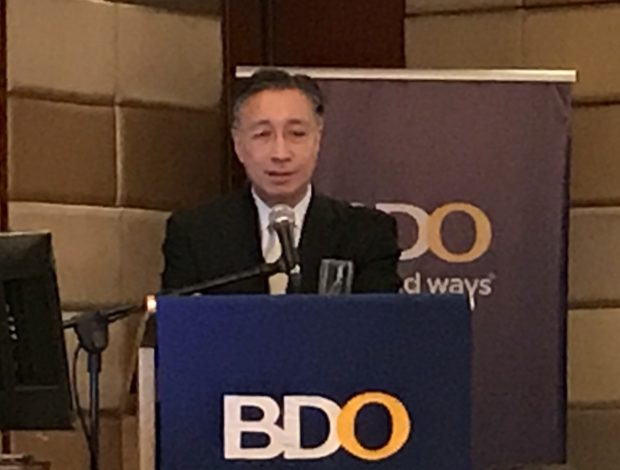
Whether right-sizing, weeding out underperforming staff or deferring new hiring of personnel, Philippine banks have begun to unveil possible moves amid the macroeconomic challenges brought about by the coronavirus (COVID-19) pandemic.
The country’s biggest lender, BDO Unibank, said on Sunday that it had no plans to downsize its manpower but would maintain its regular practice of letting go of unproductive staff.
“We believe that the Philippine economy is resilient enough to recover from the effects of this pandemic. We want to ensure that we have adequate productive capacity to take advantage of this recovery,” BDO president Nestor Tan said.
“With regards to personnel issues, age, health and competence are three different issues. If you are sick and unable to cope, we will work with you to address your individual situation,” he said.
“Age. on the other hand, means wisdom, relationship, continuity, reliability and loyalty to our clients. We value them as they contribute to our success as a bank,” Tan said in reply to Inquirer’s query.
BDO group, which is led by the Sy family, had a total of 38,510 employees as of end-2019, of which 32,631 are hired by the parent company.
“Competence issues are things we address on a regular basis. We do not need COVID to prompt us to take actions against non-performers,” Tan said.
BDO has also set aside additional P20 billion in provision for probable loan losses, on top of the P2.1 billion buffer earmarked in the first quarter, in anticipation of the disruptive impact of the COVID-19 pandemic.
The bank is expecting delinquencies to increase this year, citing the disruption in business activities, tightness in corporate liquidity, lower consumption levels and economic contraction.
The country’s second-largest lender, Metropolitan Bank & Trust Co., said that it was “focused on resuming operations under (general community quarantine) conditions and have not made any substantial announcements on the organization.”
“We are still assessing the impact of the pandemic and will continue to do so periodically so that we can take appropriate actions,” the bank said.
Metrobank had 13,150 employees as of end-2019. It was originally projecting to increase its head count to 13,690 employees by end-2020.
In the case of Yuchengco-led Rizal Commercial Banking Corp., president Eugene Acevedo said that the bank was “focused on workplace safety, comprehensive credit assistance and accelerated digital transformation.”
“We have stopped hiring as we expect lower demand and attrition has dropped from 10 percent to low single digits,” Acevedo said.
The president of another big local bank said his organization had “right-sizing” plans but was not yet ready to disclose until the controlling shareholders were consulted. “I suppose all organizations, not only banks, are putting plans together,” the banker said.
Earlier, Ayala-led Bank of the Philippine Banks (BPI) confirmed that it had offered a voluntary early retirement package to older employees while it would not give regular tenure to 30 percent of its probationary employees, equivalent to around 2 percent of its workforce. BPI had 21,429 direct employees, based on its 2019 annual report.
Most local banks have seen a decline in net profit in the first quarter. Most of them likewise set aside higher provisions for probable loan losses in anticipation of greater credit stress arising from the COVID-19 pandemic. During the two-month lockdown of Luzon and other key regions, they were required to grant a grace period to borrowers and were prohibited from charging interest on interest under the “Bayanihan” law.
In March, global credit watchdog Fitch Ratings revised its outlook on the Philippine banking sector for 2020 to “negative” from “stable,” in the face of rising asset-quality risks amid a deteriorating operating environment as a result of the global coronavirus outbreak. This outlook means a credit rating downgrade is possible in the next 12 to 18 months.
“We also see pressure on revenue from declining interest rates and the resulting economic slowdown, as enhanced community quarantine on Luzon Island – which accounted for more than 70 percent of the nation’s output – dents business operations,” Fitch said. INQ